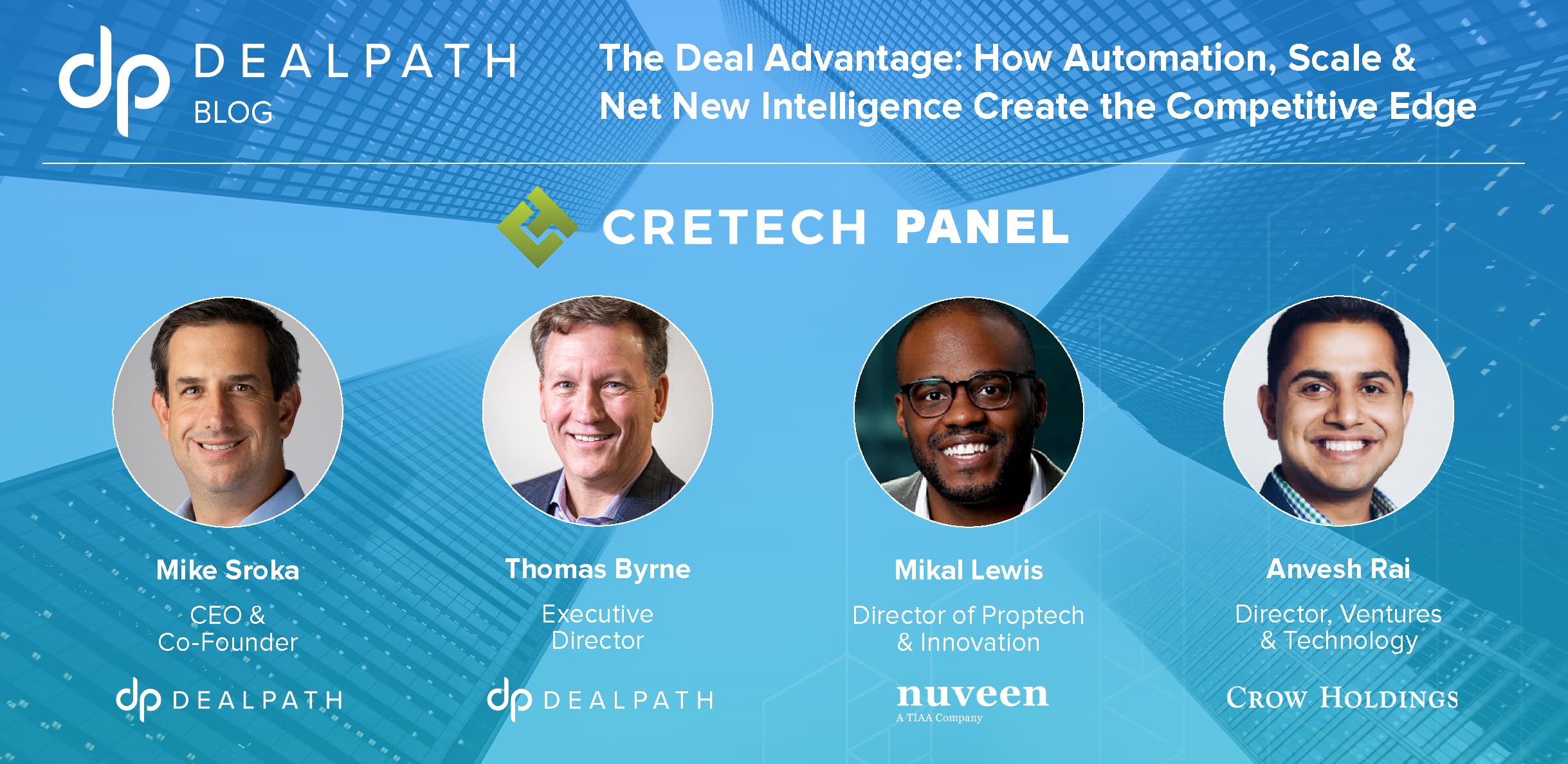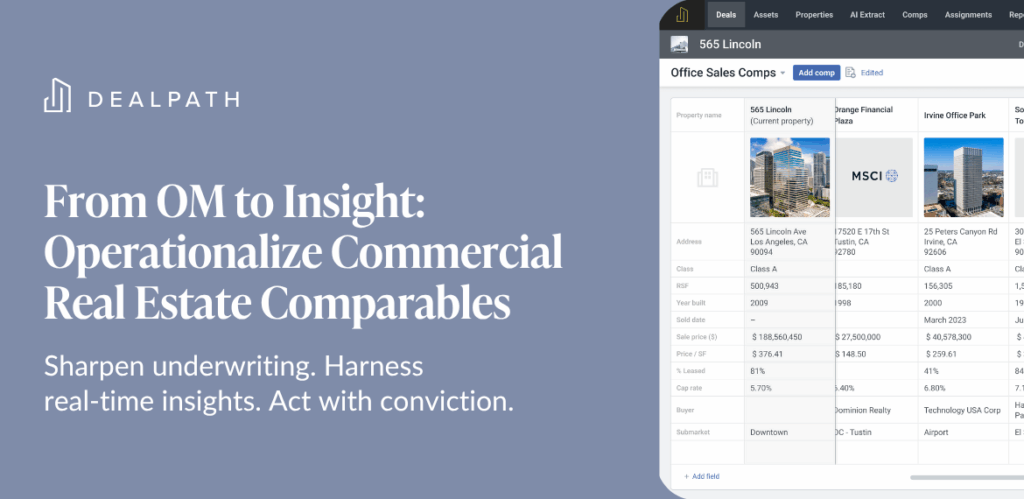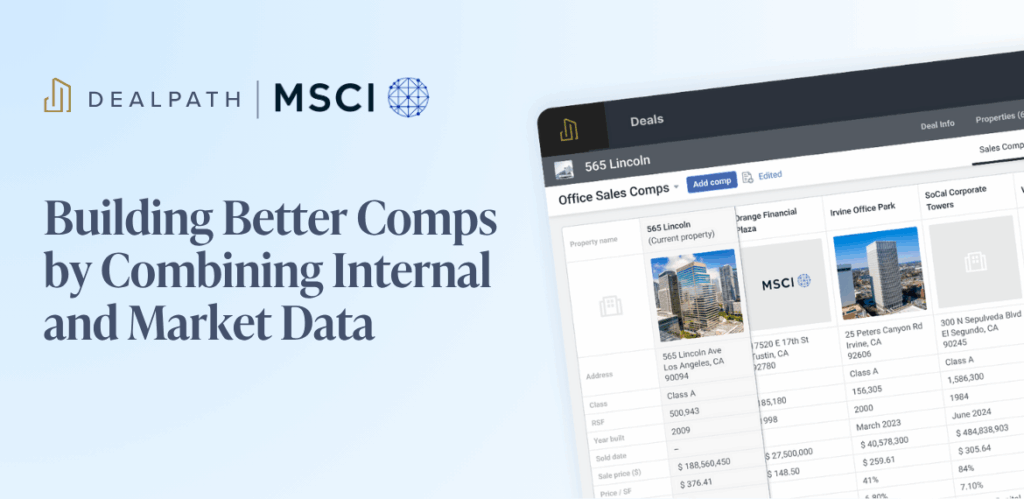Proptech adoption has exploded as more commercial real estate organizations embrace digital deal management across their global operations. Back at CREtech in October, Dealpath CEO & Co-Founder Mike Sroka and Executive Director Thomas Byrne led a discussion with proptech leaders Mikal Lewis, Director of Proptech & Innovation at Nuveen and Anvesh Rai, Director, Ventures and Technology at Crow Holdings about building a data-driven competitive advantage.
As more institutions evaluate increasing volumes of deals, they’re centralizing that data to build “data assets” with compounding value and creating unmatched, competitive intelligence. For those that don’t digitize, they’re at risk of falling behind in the fast-paced, extremely competitive CRE industry.
The discussion has been edited for style, length, and clarity.
Journey of Deal Management Digitization
Byrne: Anvesh, you’re investing in exciting proptech companies. Talk about the journey of deal management digitization, and how we’ve gotten where we are?
Rai: Real estate transaction data is highly fragmented within organizations and sits in many disparate spots. There are multiple parties collaborating when transactions happen. There’s a huge need to centralize all these datasets in one platform to reduce inefficiencies, improve the approval process, improve the reporting process, and use the insights for better decision-making for your next transaction. Firms like Dealpath are addressing this by bringing all the different investment workflows together.
The second piece is real estate is a highly specialized industry with a lot of highly confidential information. There’s a big need to have purpose-built platforms catering to the industry and managing that in a highly safe and secure manner. Transparency, clarity, and security are key in the transaction management business.
Adopting Dealpath
Byrne: Mikal, share your experience and address why you chose to make a large investment in this category.
Lewis: We made a big investment in moving forward with the Dealpath platform and are looking to roll that out globally later this year. We had the typical challenge that large organizations have. We built our own in-house solution prior to moving forward with Dealpath, and it was very expensive to build and upkeep. As we continue to grow and deal flow increases, this is a growing challenge. You had data living in silos, people not knowing where data is, data entry errors, etc. We started thinking about how to make this process better. It was a little less about technology and more about process, process, process.
With Dealpath, we found this marriage of a great technology platform that would help us from a process perspective to input data and see it all the way through the investment process. Additionally, as we look backwards, we’re looking for true data to help us get a better understanding of pipeline quality: “Was this deal a great deal”? We can use Dealpath to see historical data and build upon that to make our investment and underwriting processes much more streamlined.
Advantages of Dealpath’s Platform
Byrne: Mike, what are the value propositions for companies implementing this technology platform?
Sroka: We’ve been building out Dealpath and this category for deal and portfolio management for over eight years. There are pain points that have been felt by professionals throughout the industry, where they haven’t had tools that were purpose-built for their important work, and they’ve been cobbling together things to accomplish that. In decades past, that might be keeping pipelines in Excel documents; having Word document checklists of tasks, due diligence, and closings; and many emails and phone calls to communicate. While your investment teams are working hard underwriting deals, a lot of that information is instantly lost in emails, spreadsheets, or tools that weren’t designed for this work.
The opportunity now is for firms to operate at scale with speed and precision. We’re proud to support hundreds of institutional clients. We’ve supported more than $10 trillion of transactions. The largest, most sophisticated players in the market are leveraging these new solutions and proving that ability to scale their business including Nuveen, Blackstone, and Oxford Properties. This is translating into tangible value. Dealpath clients can evaluate 20% more deals than previously. They make 30% fewer errors in underwriting and due diligence. They see a 50% increase in weekly productivity and a 60% lift in employee satisfaction. These are big numbers that ultimately result in delivering optimal risk-adjusted returns.
Looking to the Future
Byrne: Looking out three to five years, what changes will the market bring?
Rai: In addition to improving the transaction management process, another piece is when you’re performing these transactions, there’s a lot of highly valuable data collected and used in evaluating those buildings or portfolios. That data can be used from a portfolio management perspective as well when the asset changes hands. There’s a large focus around using this data to better manage portfolios and properties, and even understand the risks related to them.
The other piece is how the buy-side teams collaborate. The holy grail lies in how we can integrate the buy-side and sell-side to almost integrated transaction management, where the sell-side can share deal flow with the buy-side. The buy-side can execute that on a platform and do reporting internally, etc. Those are two areas where the transaction management landscape is moving, and there are many opportunities.
Lewis: Everyone in this room knows that real estate tends to be a slow adopter of technology. We’re so, so early on that journey. However, we have natural tailwinds from COVID and remote work that’s forced some of this technology to move a little faster, pulling forward some demand.
When thinking about Dealpath and what we’re using it for, it’s really this technology underlay that connects many systems together, so our process is more streamlined. We’re not losing data in silos. There’s also room to take that deeper as we think about other systems – like vendor management systems and ledger systems — and how Dealpath can potentially integrate those systems.
Also, to Anvesh’s point, now that we have data historically in a place where everyone can easily and efficiently access it, maybe we build an algorithm on top of that, and that underwriting process is a lot faster. It’s about connecting as many pieces as possible to make the best investment.
Sroka: Investment decision glory is when you can see the performance of your portfolio in real time overlaid with every opportunity in the market and the comps of every asset and deal you’ve ever looked at or worked on. That’s what we want to bring to investment management firms. The longer-term future of real estate investment management and capital markets is more programmatic portfolio management and transaction execution.
But it’s going to take work to get there. The first steps are to organize and structure all the data that firms have access to, and start visualizing it, so that they can be more data-driven in their decision-making and automate steps along the way. That’s our journey, to ultimately create where the built world can transact digitally. There’s massive opportunity ahead of us.
Initiating the Digitalization Process
Byrne: Mike, what are key takeaways if someone’s thinking, “How do I transform my company and bring digital automation to bear?”
Sroka: In terms of some best practices, it’s pretty simple, logical stuff; however, change management is hard. There needs to be very clear value to making a change in your business. Having that understanding of what the big pain points are, what the opportunities are for your business, and having alignment and commitment to solve those is step one.
Step two is, as you’re evaluating solutions, they need to replace or do something much better. It can’t just be extra work for people. Third, is being thoughtful about resourcing for implementation and the ongoing management of solutions. The good news is companies like Dealpath are supporting hundreds of institutional clients and are managing the solution.
Nuveen’s Global Rollout
Byrne: Mikal, Nuveen is in the process of a global rollout with Dealpath, starting in North America, what are early insights and plans for the rollout?
Lewis: What’s been fun to see over the past month or two as we’ve started to roll out Dealpath, is a lot of excitement and engagement around a solution that will make everyone’s lives better. Oftentimes, investment managers get bogged down doing things that they would rather not be doing that are more manual and take them away from higher, value-add strategies, etc. With Dealpath, you start to see things shift to make everyone’s lives easier.
As far as the global rollout, we’re not necessarily looking for any metrics, per se, on what it would take to pull the trigger. But what we want to make sure is that everyone is comfortable and knows how and where to access the system, and which users have which functions and responsibilities. We’re doing weekly sessions with Dealpath experts to ensure that everyone is sufficiently transitioning from our in-house-made system to Dealpath. Once we see everyone move off that current data management platform for upcoming deals in the pipeline, we’ll feel more comfortable rolling out to the rest of the Nuveen platforms.
Invest With Speed, Precision and Scale on Dealpath
If you’d like to see how Dealpath can help your firm systemize data-driven investment decisions, request a demo now.
Request Demo



